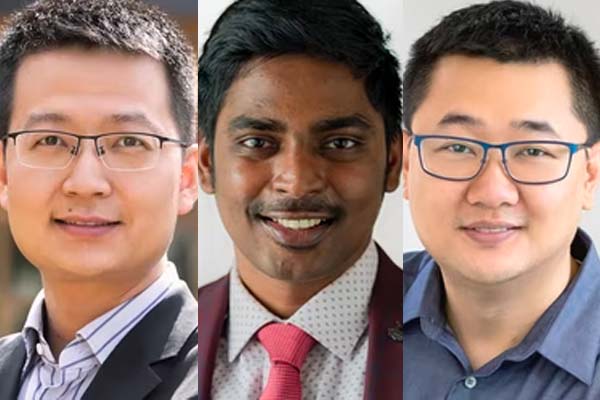Bai, Nagulu, Zhang receive Collaboration Initiation Grants
The $25,000 award promotes innovative interdisciplinary research

Peng Bai, Aravind Nagulu and Ning Zhang, all assistant professors in the McKelvey School of Engineering, have been awarded $25,000 Collaboration Initiation Grants from the school.
The program awards one-year grants to projects that facilitate collaborative research outside of and within McKelvey Engineering departments for tenure-track faculty. The grants are a pathway for faculty to apply for larger, interdisciplinary grants, to create a more synergistic project than could be achieved by one researcher in one discipline, and to demonstrate the potential to sustain the collaboration and obtain external funding. Each awardee receives $20,000 from the school and must have $5,000 in cost-sharing from their department or collaborators.
Bai, in the Department of Energy, Environmental & Chemical Engineering, will work with Rohan Mishra, associate professor of mechanical engineering & materials science, to develop a new battery that would be a potential lower-cost substitute for commercial lithium-ion batteries. The two researchers plan to develop Prussian blue analogue sodium-ion storage materials that could be used as cathodes in anode-free sodium metal batteries, which can exhibit similar performance of lithium-ion batteries but at a lower cost. In this work, the interdisciplinary team will focus on controlling the defects in the bulk and surface of the Prussian blue analogue particles and optimize the additives in the electrolytes.
Nagulu, in the Preston M. Green Department of Electrical & Systems Engineering, will collaborate with Erik Henriksen, associate professor of physics in Arts & Sciences, and Kater Murch, professor of physics and an affiliate faculty member of electrical & systems engineering and computer science & engineering. The team plans to address the need for compact, low-cost and scalable equipment for control and readout of thousands of quantum bits, or qubits, basic units of information in quantum computing, that would supply future quantum computers. These electronics implemented on complementary metal-oxide-semiconductor (CMOS) platforms may be a solution to address various challenges of dense readout and scalability because they can integrate billions of transistors on a single chip. In addition, they plan to develop very low-temperature, cryogenic signal routing lattices based on time modulation to facilitate on-demand quantum transport between two qubits.
Zhang, in the Department of Computer Science & Engineering, will collaborate with Ting Wang, the Sanford and Karen Loewentheil Distinguished Professor of Medicine and professor of genetics at the School of Medicine and an affiliate faculty member in the Department of Computer Science & Engineering in the McKelvey School of Engineering. They will address computer security and privacy challenges of medical data needed for scientific research by implementing a prototype of Medical Study as a Service, an open access system for medical research that preserves the privacy of patient data. It would allow both the data owner and the data user to jointly use the data without risking patient privacy or accuracy while giving up a small amount of computational power. The work builds on a prototype that Zhang and Wang have developed over the past few years.
Click on the topics below for more stories in those areas
- Research
- Computer Science & Engineering
- Electrical & Systems Engineering
- Energy, Environmental & Chemical Engineering





